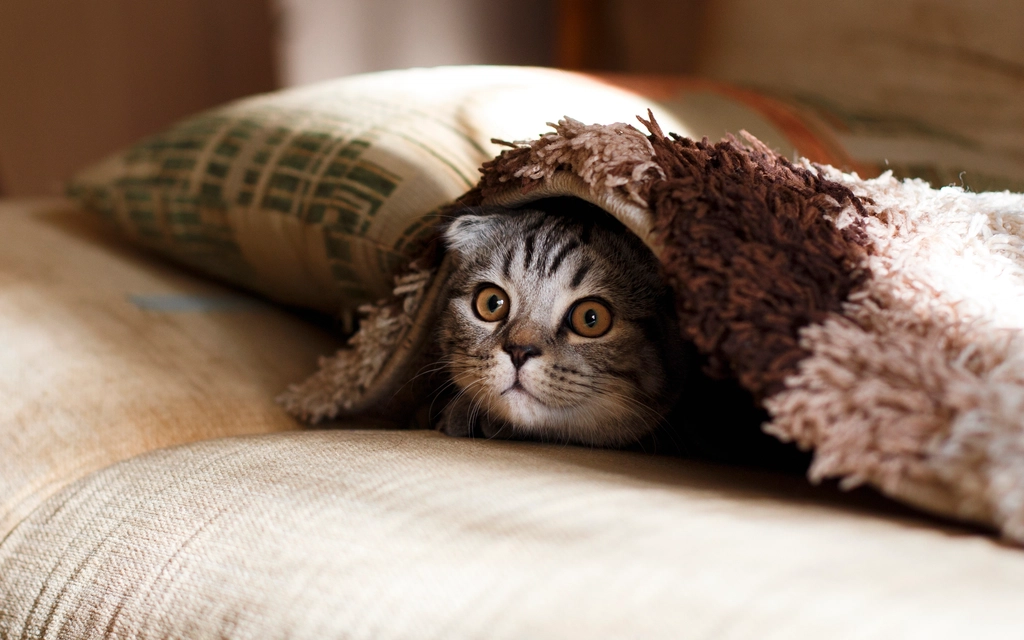Have you ever noticed your cat suddenly vanish, slipping away to a shadowy corner or under the bed, leaving you puzzled and perhaps a bit hurt? These mysterious disappearances are not random acts of feline mischief—they are often silent cries for comfort or peace. Understanding what stirs such quiet retreats in our beloved cats can be both eye-opening and heart-wrenching. Cats are deeply emotional creatures, easily affected by the world around them. Their triggers are sometimes invisible to us, but the pain or stress they feel is very real. As caretakers, unraveling these emotional cues can transform how we nurture and connect with our whiskered companions.
Sudden Loud Noises

For cats, the world can be a noisy and unpredictable place. A sudden clap of thunder, the crash of a dropped pan, or even the blare of a television can send a cat running for cover. Loud noises trigger a cat’s instinctual fear response, rooted in their wild ancestry where sudden sounds often signaled danger. When faced with unexpected noise, your feline may tuck herself away in a closet or under a bed, seeking the safety of silence. These retreats are not about punishing you—they’re about finding a sanctuary from the chaos. Even the most confident cats can be startled by loud, unfamiliar sounds. If your cat disappears after a noisy event, understand she is simply trying to regain her sense of security. Soft music or gentle reassurance can sometimes coax her out, but patience is key.
Changes in Household Routine

Cats are creatures of habit, thriving on predictable daily patterns. When their world shifts—perhaps you’ve changed your work hours, brought home a new pet, or rearranged the furniture—cats can feel unsettled. These changes disrupt their sense of control and safety. A cat responding to a new routine may slip away quietly, watching from a distance as she tries to make sense of her altered environment. You might notice her eating less, playing less, and seeking out hidden spots more often. Unlike dogs, cats rarely confront stress head-on; instead, they withdraw and observe. Simple acts, like feeding or playing at the same time each day, can do wonders in restoring your cat’s confidence. Routine is like a security blanket for cats—when it’s disturbed, retreat is often their only comfort.
Introduction of New Animals or People

Nothing unsettles a cat quite like the arrival of a stranger—whether it’s a new puppy, a visiting friend, or even a newborn baby. Cats are territorial animals, and every addition to their domain feels like an invasion. Some cats may respond with hissing or swatting, but many will simply retreat. You might find your cat hiding in closets or wedged behind furniture, peering out with wide, anxious eyes. This behavior is driven by fear and uncertainty rather than spite. Cats need time to size up newcomers before feeling safe again. Providing them with quiet, high-up spaces or secluded hideaways helps them adjust at their own pace. Remember, forcing interactions can backfire; patience and gentle encouragement will help your cat emerge when she’s ready.
Past Traumatic Experiences

Just like humans, cats can carry emotional scars from their past. A kitten rescued from a noisy shelter or a cat who once lived on the streets may be especially sensitive to certain triggers. Even after finding a loving home, the memory of trauma lingers. If a particular sound, scent, or situation reminds your cat of a frightening past, she may retreat without warning. Her silence is a signal that she’s reliving a moment of deep fear. Earning the trust of a traumatized cat takes time, gentleness, and consistency. Offering safe spaces and respecting her boundaries will slowly build her confidence. Each time she retreats, she’s not rejecting you—she’s simply trying to protect herself from old ghosts.
Overstimulation or Too Much Attention

While many of us love to cuddle and play with our cats, it’s easy to forget that too much attention can overwhelm them. Unlike dogs, cats have a lower threshold for physical interaction. Petting, especially in sensitive areas or for too long, can quickly shift from pleasure to discomfort. You might notice your cat’s tail flicking, ears flattening, or skin twitching before she slips away to recharge. Cats who retreat after playtime or petting sessions are not being ungrateful; they’re simply communicating their need for space. Respecting these subtle cues will help maintain trust. Think of your cat as a guest at a party—sometimes, she just needs a quiet room to herself.
Feeling Unwell or in Pain

A cat’s instinct to hide when sick or in pain is powerful. In the wild, showing weakness could make her vulnerable to predators, so retreating quietly is a survival tactic. At home, this means she may disappear when feeling under the weather. Cats are masters at masking illness, so any sudden change in hiding behavior should be taken seriously. You might notice your cat sleeping more, avoiding food, or seeking out cool, dark spaces. If your normally social cat starts vanishing for hours, it could be her way of coping with discomfort. It’s important to be vigilant and consult a veterinarian if these retreats become frequent or prolonged. Your attention could mean the difference between a simple cold and something more serious.
Negative Associations with Certain People or Places

Sometimes, a cat’s retreat is tied to specific people or areas in your home. Perhaps a child once chased her, or a particular room brings back memories of being scolded or frightened. Cats form strong associations and can develop aversions to anything linked with fear or discomfort. If you notice your cat avoiding certain laps or disappearing when a specific person enters, it’s likely she’s responding to a past negative experience. Building positive associations through treats, gentle petting, and calm voices can help rebuild her trust. Allowing your cat to approach at her own pace is crucial—forcing contact will only deepen her retreat.
Overwhelming Smells or Scents

Cats experience the world through their noses, and strong or unfamiliar scents can be deeply upsetting. The smell of cleaning products, perfumes, or even certain foods may drive a cat to seek refuge. What seems pleasant or harmless to us can be overpowering to a feline’s sensitive nose. Sometimes, bringing home a new scented candle or using a different laundry detergent can be enough to send your cat scurrying away. If you notice your cat vanishing after you’ve cleaned the house or sprayed air freshener, consider the possibility that her retreat is scent-related. Opting for fragrance-free products and maintaining familiar smells can help keep your cat feeling secure.
Each of these emotional triggers reveals just how sensitive and complex our feline friends truly are. By paying attention to these quiet retreats, we can better understand and support the emotional lives of our beloved cats.

Growing up traveling and experiencing new cultures and wonders, I have had a passion for nature, adventuring, photography, and videography. I am currently working towards a BSc in Biodiversity and Ecology at Stellenbosch University, and I hope to specialise in Marine Sciences one day.
Please send any feedback to Feedback@animalsaroundtheglobe.com





